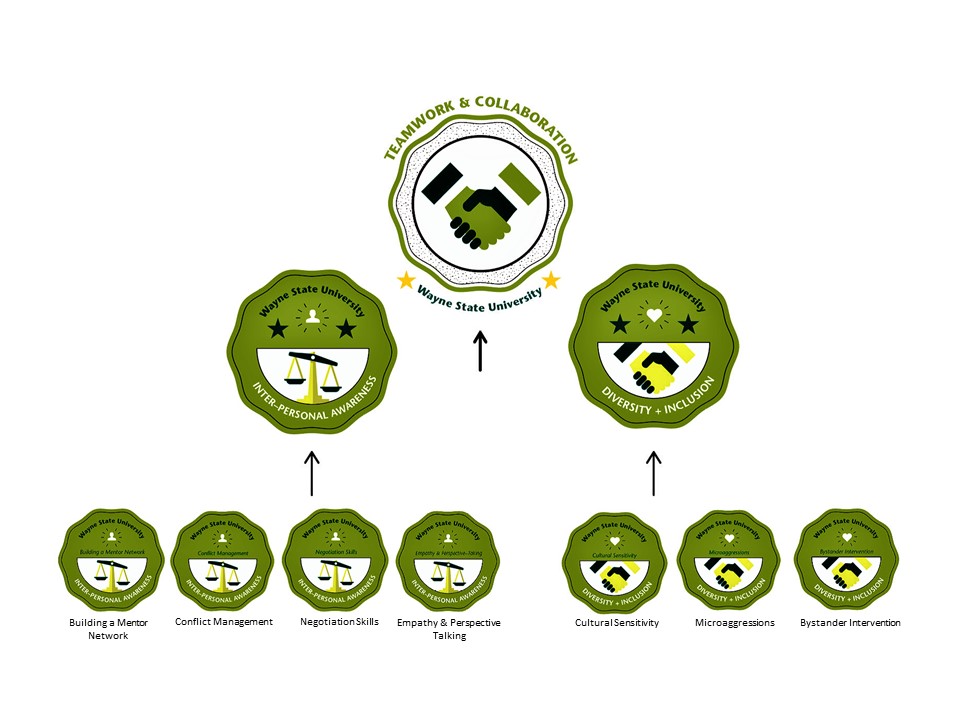Adapting techniques from the gaming world led to increased interest in professional development activities among Wayne State graduate students. In 2016, the Graduate School launched the Graduate and Postdoctoral Professional Development (GPPD) career development series and an innovative digital badging system to help students demonstrate key job skills to potential employers on social media such as LinkedIn and Facebook.
The Graduate School digital badging system was featured in a recent article in Change: The Magazine of Higher Learning. Several universities around the country have contacted the Graduate School asking for guidance in developing a digital badging system for their graduate students, or have asked to partner with Wayne State to create a system on their campus.
 To enhance professional development, Wayne State graduate students have the opportunity to earn microcredentials or digital badges in five core competencies valued by employers. Earners must complete one level before badges are unlocked from the next level.
To enhance professional development, Wayne State graduate students have the opportunity to earn microcredentials or digital badges in five core competencies valued by employers. Earners must complete one level before badges are unlocked from the next level.
“The gaming element of our badging system makes it fun and competitive to earn microcredentials and progress to the next level,” said Ambika Mathur, associate provost, Graduate School dean and lead author. “We found the method for tracking growth and demonstrating continuous advancement was motivating and exciting for students. Students also appreciate the opportunity to add the badges to their social media profiles to demonstrate to prospective employers they can hit the ground running.”
For example, students must first complete a series of competencies at the first level (i.e. negotiation skills, conflict management and micro-agressions) before advancing to the second level of interpersonal awareness and diversity and inclusion, before moving to the third and final level to earn the overall badge for teamwork and collaboration, one of the five core competencies. The four other core competencies are communication; leadership and professionalism; research and professional ethics; and career development.
Students earn badges after attending a series of interactive seminars taught by faculty experts and completing an exercise to demonstrate mastery. Once a microcredential is earned, the badge in graphical form can easily be shared on LinkedIn, or on personal and professional websites for employers to view. Wayne State is the official issuer of the badge, adding credibility and validity to the microcredential.
“Now in its third full year, we’ve had good success in rolling out microcredentialing with overall attendance in the GPPDs doubling after one year,” said Mathur. “We realize they are not substitutes for conventional university degrees, but digital badges play an important role in certifying skills and helping our students create a customized portfolio for the 21st century job market.”
A student who participated in the GPPD seminar series and earned a digital badge(s) shared these thoughts in the Change article: “In the past, I have used traditional approaches to building my resume. I have learned that more and more employees even in academia are using professional job sites on social media to select candidates. Micro-credentialing is an exciting way for me to build a portfolio of digital badges which will benefit me when I am on the job market.”
Other team members who contributed to the article include Annmarie Cano, associate provost for faculty development and success, and Mary E. Wood, program director, Office of Scientific Training, Workforce Development and Diversity.
“This is the first publication to our knowledge that describes a badging system for graduate students,” said Mathur. “This movement is still in its early stages and continues to gain traction, however it has the potential to be used at Wayne State for other stakeholders including undergraduates, faculty and staff.”